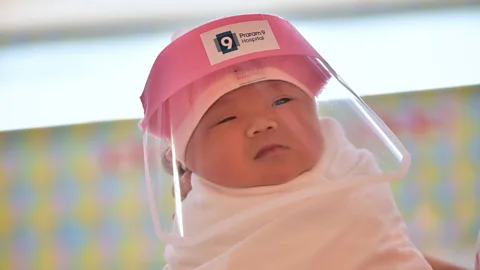As a baby, everything is new: every visit to the park, every smell inside a grocery store, every touch of a soft pet. So what happens when a baby doesn’t experience a rich tableau of life experience?
In England, the Born in Covid Year Core Lockdown Effects (Bicycle) study is trying to tease apart the role of lockdowns on children born between March and June 2020.
“We were really concerned during Covid that children were getting a very unusual experience,” says Lucy Henry, a professor of speech and language at City St George’s, University of London.
The study follows two groups of 200 children born before the pandemic, during the lockdowns of 2020 and after they were lifted in 2021, focusing on language skills and executive functioning at age four. The researchers play simple games with the children – including one where they have to click when a cat appears on a screen. The aim is to “splat the cat” but avoid clicking when they see a dog – a measure of inhibition and other executive functions.
Their preliminary findings are due to be published later this year, but the researchers say their results seem to indicate that children who were babies during the pandemic have fewer words and may struggle more with higher-level thinking skills. “The overall picture across the evidence is that communication seems to be something that might have been impacted,” says Nicola Botting, a developmental psychologist at City St George’s, University of London, who is the co-lead of the study.
The researchers are hoping their work will help them understand the reasons for this delay, although they speculate that the lack of social opportunity in the first year of life may have had an outsized impact on children’s development. Babies born in the strictest of lockdowns didn’t get the more public social communication opportunities, like waving at people, going on a swing, seeing different faces talking, or hearing different voices talking.
“We know from a wide body of research, those early few months are super important in terms of learning the foundations of social communication,” says Botting. “Although babies look like they’re doing nothing, they are doing things, and one of those things is taking in diverse social opportunities.”
 Getty Images
Getty ImagesWhile the longer-term implications of those developmental delays will take time to understand – and it may be possible that such young children can catch up relatively quickly – one of the main areas of research on the effects of the pandemic on youngsters has been on education.
An estimated 1.6 billion students in more than 190 countries had their education disrupted by the pandemic. When schools closed, large portions of learning passed to parents who home-schooled their children alongside remote learning sessions over the internet. Children without access to computers or reliable internet connections inevitably suffered more.
In 2023, the National Academies of Sciences, Engineering and Medicine in the US published a wide-ranging report on the effects that Covid-19 pandemic had taken on children, finding that “across all measures of school engagement and learning outcomes, students appear to be worse off” than they would have been without the pandemic. The effects are particularly pronounced among those from low-income families and marginalised communities, a pattern that crops up repeatedly when looking at many aspects of how Covid-19 has affected children.
Chillingly, the report concludes that the losses in learning that occurred during the pandemic era could have lasting economic implications once these children reach adulthood.
One recent study published in January 2025 tried to quantify the learning loss, using global test score data. They found that mathematics scores declined an average of 14% – roughly equal to seven months of learning for a student.